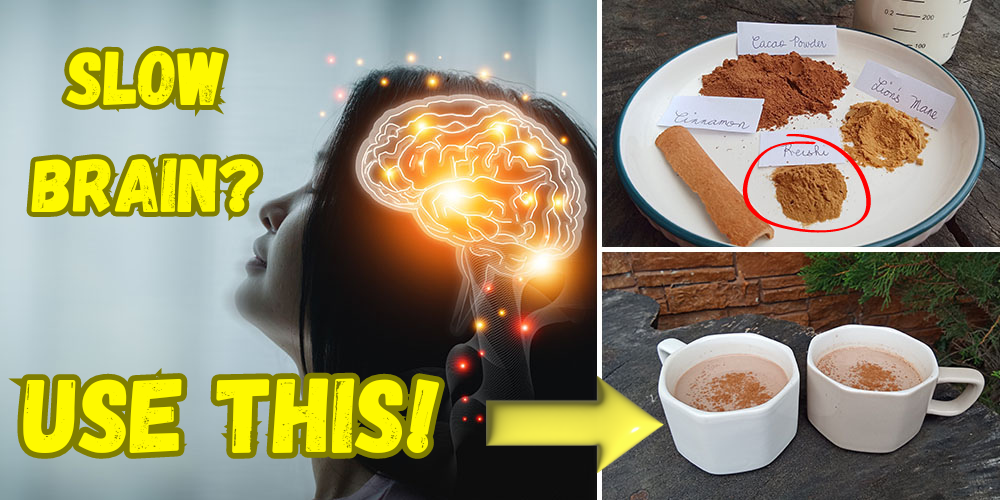
Your Brain Slows Down When You Lack This Vitamin
The brain is a complex organ with a mysterious existence. One of its greatest scientific mysteries is how it gets “killed” by degenerative neurological diseases. Over time, the brain may slow down, decrease cognitive functions, erase memories or destroy itself.
Many brain-related diseases are incurable and irreversible. Fortunately, they can be delayed, if not prevented.
Vitamin and mineral deficiencies contribute to neurological degeneration. One of the most important is Vitamin B12, a lack of which can cause the brain to slow down and create various neurologic impairments.
Important Note: If you follow a vegan or vegetarian diet, it’s especially important for you to pay attention to your Vitamin B12 intake. Since B12 is mainly found in animal-based products, you may need to take supplements to ensure you’re meeting your nutritional needs.
There are several ways of increasing your Vitamin B12 intake for the best benefit of the brain and its functions.
Impact of B12 on Brain Functions
Vitamin B12 (cobalamin) plays an active role in the brain, nerve and blood cell functions and development. It is responsible for blood cell formation, cell metabolism, nerve function, and DNA production.
An initial study published in 2020 suggests a clear association between low Vitamin B12 levels and progressive cognitive impairment. Further studies are still needed to refine and confirm the findings on a larger scale.
Cobalamin supports the following functions in the brain and body:
Red Blood Cell Formation
Healthy red blood cells are typically small and round, making them easier to pass through the bloodstream.
A vitamin B12 deficiency may alter the shape where the RBC becomes larger and oval. RBCs will then have difficulty moving in the blood vessels which disrupt the oxygen supply in the brain. Without enough oxygen, it will cause hypoxia and can lead to brain damage if left untreated.
Vitamin B12 aids in RBC production and formation to promote better blood and oxygen transport and support brain health.
To avoid brain damage from hypoxia, it’s crucial to keep blood pressure within normal levels. Diets high in processed foods, trans fats, and excess sodium can narrow blood vessels, increasing the risk of hypertension. This strain on the heart can lead to hypoxia.
Maintaining a healthy heart through balanced blood sugar, a nutritious diet, and regular exercise is essential for preventing these issues.
Since regular exercise isn’t an option for me, I strengthen my body with medicinal herbs in tincture form. These support my heart and help regulate my blood. Here’s what I use daily!
Improve Memory
Vitamin B12 works with omega-3 fatty acids to slow down the early stages of dementia, especially in elderlies. In 1950, it was found that dementia was associated with low cobalamin status.
Treatment with Vitamin B12 did not necessarily yield sufficient evidence that it can treat dementia. However, it is shown to have improved the hematological signs in patients with pernicious anemia.
If caught early on, memory loss can be prevented with an adequate intake of Vitamin B12. It can enhance the brain’s cognitive functions for better memory retention and focus.
Reduce Stress and Depression
Numerous clinical studies are being performed to determine the relationship between depression and Vitamin B12. Some studies concluded that Vitamin B12 supplementation can delay the onset of depression and improve the effect of antidepressants.
Vitamin B12 and other B vitamins produce the chemicals serotonin and dopamine, which helps in mood regulation. Maintaining an adequate level of Vitamin B12 results in a good mental state.
Decrease the Stress Level
Vitamin B12 supplements may also help improve stress levels. It can decrease the stress hormone to control the body’s reaction to stress. By easing depression and anxiety, it keeps the brain active to maintain its sharpness.
Internal use of herbs will always stand out as a useful remedy. Essential oils may be a great support as well. However, if you prefer a quicker fix to your stressful moments, I’d rather recommend a tincture to do the job.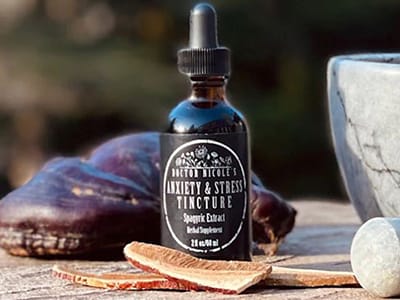
Combining natural potent herbs you can relieve all your anxiety and stress in minutes. It really did the job for me. It helps your body adapt to stress and calms the nervous system. This is associated with anxiety, depression, and stress-related insomnia. Check it out HERE!
Sources of Vitamin B12
Cobalamin is a water-soluble vitamin that is readily available in many foods. Older people may need oral supplementation and sometimes intramuscular injections if the deficiency is significant.
A vitamin B12 supplement is also recommended for strict vegetarian and vegan individuals. They are at high risk of deficiency since plants cannot produce Vitamin B12.
The sources of Vitamin B12 for the body are:
- Lean red meat
- Poultry products like eggs and chicken
- Fish and seafood (salmon, catfish, clams, oysters, etc.)
- Dairy products (milk, cheese, yogurt or fortified milk substitutes)
- Fortified cereals
Other sources of Vitamin B12 include:
Nutritional Yeast
Nutritional yeast is often used as a cheese substitute and seasoning in vegans’ diets. It is basically the same as baker’s yeast or brewer’s yeast but without the leavening power. It is considered the most reliable and consistent source of Vitamin B12.
Nori
Nori is an edible seaweed that can be bought in a dry and brittle sheet form commonly used in preparing sushi. It contains a high amount of cobalamin, and eating only 4 grams of it supplies the body with the Vitamin B12 RDA.
You can find nori in many Asian food stores.
Mushrooms
Mushrooms are well-valued brain foods for their ability to provide the body with the required brain nutrients. Lion’s mane (Hericium erinaceus), cordyceps (Cordyceps sinensis), Reishi (Ganoderma lucidum) and shiitake mushrooms are all beneficial in preventing brain fog and brain-related diseases.
I used to be unsure about mushrooms as remedies… but that changed after experiencing their incredible potency firsthand. It’s important to realize how powerful these natural ingredients can be. That’s why I include them in my medicinal cabinet—because I’ve seen the difference they make, and I believe they can truly benefit others too.
The only drawback is that these mushrooms are quite rare and hard to forage, and I rarely come across them in powder form. While the recipe below uses mushroom powder, I personally rely on tinctures because they are more potent, and I trust the source where I get them.
This certified Apothecary has everything I need for my health conditions!
Kombucha and Fermented Teas
Kombucha is a probiotic drink fermented with a symbiotic colony of bacteria and yeast. It enhances the digestive processes, reduces inflammation and keeps the blood cells healthy. Kombucha can provide 100% RDA of vitamin B12 to prevent megaloblastic anemia and brain fog.
Chlorella
Chlorella (Chlorella pyrenoidosa) is a microgreen algae or seaweed used for nutrition and medicine. It contains active Vitamin B12, one of the few plant sources to have an active B12.
Brain-Boosting Mushroom Hot Choco
Adding mushrooms to your usual morning cup is a boost of energy for your body and brain. Mushroom extracts and powder are available in many health stores for easy preparation.
In this recipe, we will make use of the nootropic effect of Lion’s mane mushroom with its high level of Vitamin B12. Lion’s mane is an excellent herb for brain health that is said to give the user the memory of a lion and nerves of steel.
It also has Reishi, the Miraculous King of Herbs, packed with B-complex, including B12. Reishi is also rich in Vitamin D, a rare vitamin only found in a few foods. Vitamin D is also an important nutrient that can improve brain health.
Depending on your choice, you may swap chocolate for coffee and use a dairy-free milk substitute for whole milk.
Ingredients
 2 cups whole milk (or plant-based milk)
2 cups whole milk (or plant-based milk)- 2 tbsp. cocoa powder
- 1 tsp lion’s mane mushroom powder or tincture
- ½ tsp reishi mushroom powder or tincture
- 1 cinnamon stick
- Raw honey or maple, to taste
Steps
- Combine milk, cacao powder, mushroom powders, and cinnamon in a pot.

- Heat on medium-low for 5 to 8 minutes (or until heated through) while whisking thoroughly.

- Remove the cinnamon stick.
 Sweeten to taste.
Sweeten to taste. 
- Pour into mugs and add garnish like cinnamon powder, cocoa powder, or marshmallow if desired.

To use: Enjoy a cup of this mushroom coffee once a day for a week to get your brain-boost. While the recipe is considered safe, it should be taken in moderation and for a limited period to avoid side effects.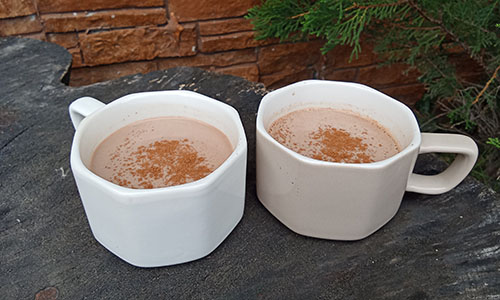
Lion’s mane and reishi are medicinal mushrooms and may cause side effects like upset stomach in supplement form. They may also interfere with medications for high blood pressure, blood thinners, and liver medications.
You may wonder why I chose to add cinnamon to this hot chocolate recipe. And no, it’s not just for the taste.
You’d be surprised by the amazing thing cinnamon does to your brain. An herbalist wrote about it and I was shocked! Check out the image below.

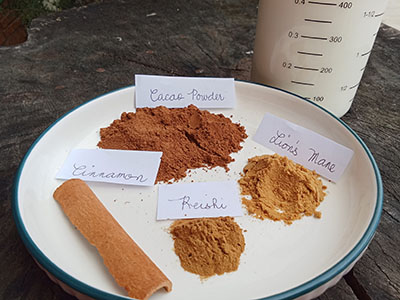 2 cups whole milk (or plant-based milk)
2 cups whole milk (or plant-based milk)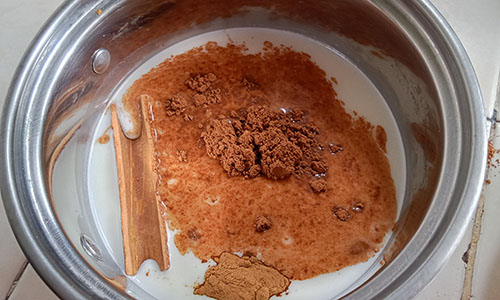
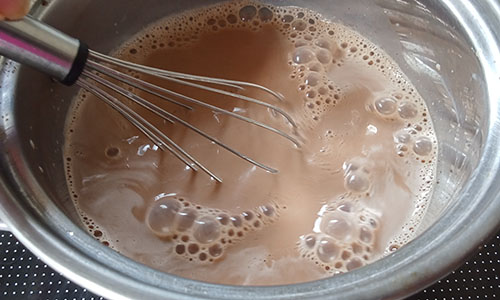
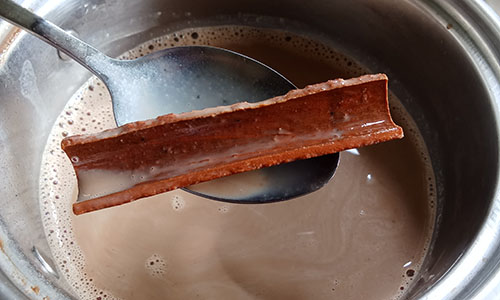 Sweeten to taste.
Sweeten to taste. 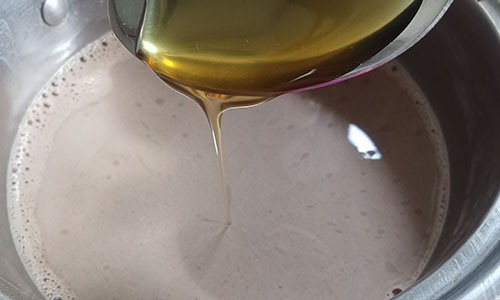
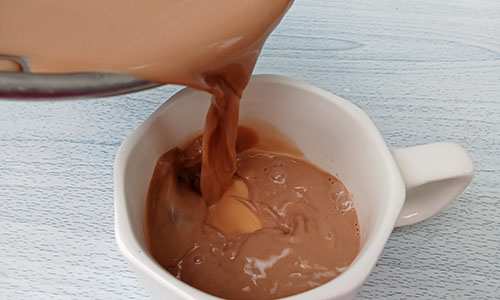
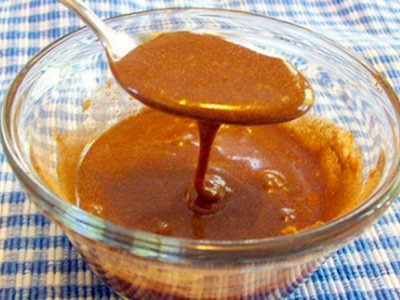
Nicole I have MTHFR and have a difficult time finding B vitamins that work. I struggle with a lot of vitamins, I am also anemic, do you have a suggestion? I am having this problem right now.
Not to be confused with manmade vitamin B12 Cyanocobalamin wich contains Cyanide
Mine grans